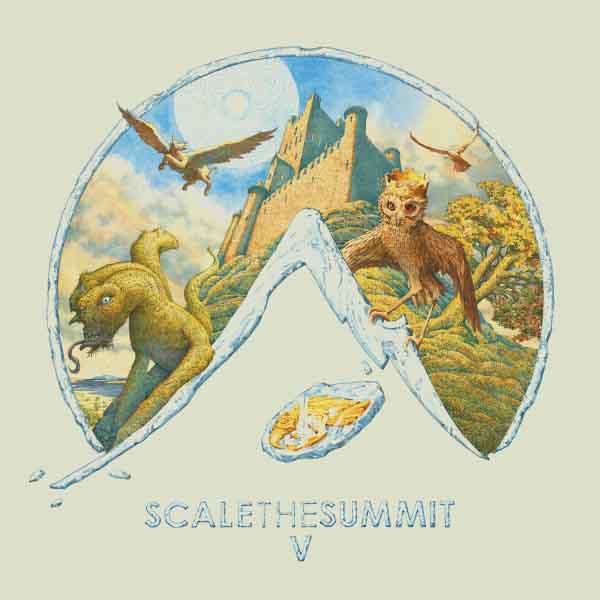Everyone has at least one person in their network who is obsessed with “smart” music; your local government will provide you with a complimentary one if you have any doubts. You can tell music is “smart” by the fact it’s either instrumentally complex, aesthetically gimmicky, or even merely composed of band members who agree with some of your socialpolitical opinions. V is not the first to the best of my knowledge, but its ties to the djent and “progressive metal” scenes give Scale the Summit a built in audience full of such people. The relatively clean guitar tones and otherwise frequent moments of gentle strumming make me question the metal label, but I’m not yet the type to judge music solely by its genre. It does mean, however, that I’ve mentally shelved this on the progressive rock shelves along with acts like Camel and Yes, which admittedly are radically different in overall approach, but at least give this album some stern competition which it desperately needs.
V is actually a collection of jazz fusion instrumentals that presumably took some time to practice and learn even for the band’s technically skilled musicians. Much has been written on the idea of jazz-metal fusions, but Scale the Summit seems quite archetypal in that regard, relying on thorough-composed songwriting with distinct sections over improvisation, but favoring lighter, cleaner tones and sounds even at their most intense. One thing that divides me is how rigidly and academically the band approaches song structure – tracks here are full of obvious “We’re going to vary the song by modulating to another key or changing the drum pattern” type moments that probably look well-planned if you consult the corresponding tablature, but don’t work out in practice for being too jarring or too frequently followed by an obvious pause. This might be something to expect from such a rhythm-heavy style, but it still strikes me as a notable weakness, and one that makes some of these songs so self-conscious that it interferes with their overall memorability and impact.
Ultimately, I find Scale the Summit to be aesthetically pleasing, and I can derive some intellectual satisfaction from piecing together the theoretical level of their music, which is more than I can say for a lot of so-called progressive metal. I can’t guarantee that I won’t plunder V for some of these technical ideas. Employing this prowess towards more interesting and less obvious (less formulaic) songwriting is going to be quite a challenge, though. I can’t guarantee you that Scale the Summit will do the same, since they seem pretty content with their current technically proficient but otherwise ephemeral style.
10 CommentsTags: 2015, djent, jazz fusion, mainstream metal, scale the summit, v



